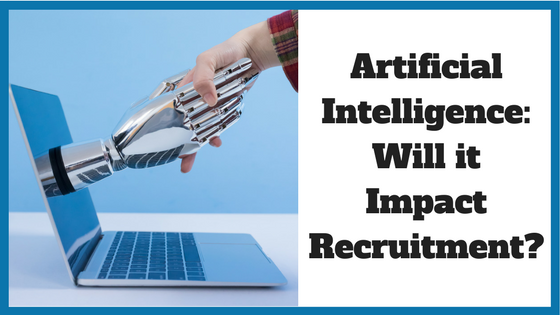Artificial Intelligence: Will it Impact Recruitment?
Artificial Intelligence (AI) is everywhere. You’ve probably read stories in the news lately, where Elon Musk is prophesying doom or about Facebook shutting down two of their experimental AI’s when they created their own language to communicate. But the truth is that you’re probably interacting with AI’s more often than you know.
Broadly speaking, there are two different kinds of Artificial Intelligence. The kind that gets Elon Musk in a panic is called broad AI and that’s usually experimental and able to grow and change itself. The other kind is narrow AI, which is designed to automate certain tasks. If you’ve interacted with the online chat on a website lately, you may have been speaking to a bot rather than a person.
Advances in technology mean that AIÂ is now very reliable in asking the right questions to get a solution. Perhaps even better than people. The John Radcliffe Hospital in Oxford ran a trial where they compared the accuracy of diagnosis of heart conditions between an AI and a doctor. The AI was more reliable at the diagnosis. Why? Because it stuck to the facts.
It’s this narrow AI that is most likely to impact recruitment. And while automating tasks hasn’t traditionally been a good thing for the workforce, this breakthrough may just be the one we were waiting for. The Future of Work Commission recently recommended that the market move more towards automation, to free up staff to do more creative or complex work.
AI and recruitment
With some vacancies attracting hundreds of applicants, it’s easy to see the advantage of having an AI that can guide them through the early stages of the recruitment process. In fact, this wouldn’t be very different to the filtering tools that are currently used to narrow down the number of CVs to a more manageable level.
So, what can be automated?
Ideal applicant screening
Mya is an app that is currently in beta test mode. It’s a chat bot, that is, it will ask your candidates questions and rank them based on their answers. You can set it up yourself with questions, and some answers to the questions you’re expecting from candidates. If Mya doesn’t know the answer, it will say so and let you know to get back to the applicant with that information.
Find the serious candidates
Olivia is a similar app to Mya, however it’s purpose is to help candidates to work out if they want to apply for the job or not. By the time they’ve finished their chat with Olivia, any applicant should know enough to decide whether to submit their resume or not, saving you the time-wasters.
Analyzing CVs
Pomato is an AI that will make you feel good about every CV you’ve ever appraised. The app analyses resumes and carries out over 200,000 calculations to decide if they’re the right fit for a company.
Headhunting
Apps are in development that will be able to seek out CV’s on sites such as LinkedIn and decide who you should be targeting for your organization. Because they’re automated, they can carry out those tasks so much faster than a human and deliver you a list that you can go and check out in person.
This is just a sample of what is in development at the moment, you can expect AI’s to become a bigger part of all walks of life as technology advances (and especially as Virtual and Augmented Reality become more affordable).
While automation has been linked to job losses in the past, it does seem that there is value in using it as a tool to free people up to do the tasks that can’t be done by computer. They may be able to analyze a CV, but a person is still best placed to decide how that personality will work within an existing team. It makes sense to have AI complete repetitive tasks, that is the strength of a computer and creativity is ours.
We started with the question, ‘Will AI impact recruitment?’ and the answer is an undeniable, ‘Yes.’ In fact, it already has. You can expect to see more tools coming in the near future that will help smooth the recruitment process. Applicants will begin to expect their pre-interview to be with a chat bot, rather than a person. In fact, forward thinking applicants may prefer to use firms who trust tasks to AI – unless they’re Elon Musk.
About the Author Sarah Dixon
Sarah Dixon writes for Inspiring Interns, which specialises in finding candidates their perfect internship. To browse our graduate jobs London listings, visit our website.

